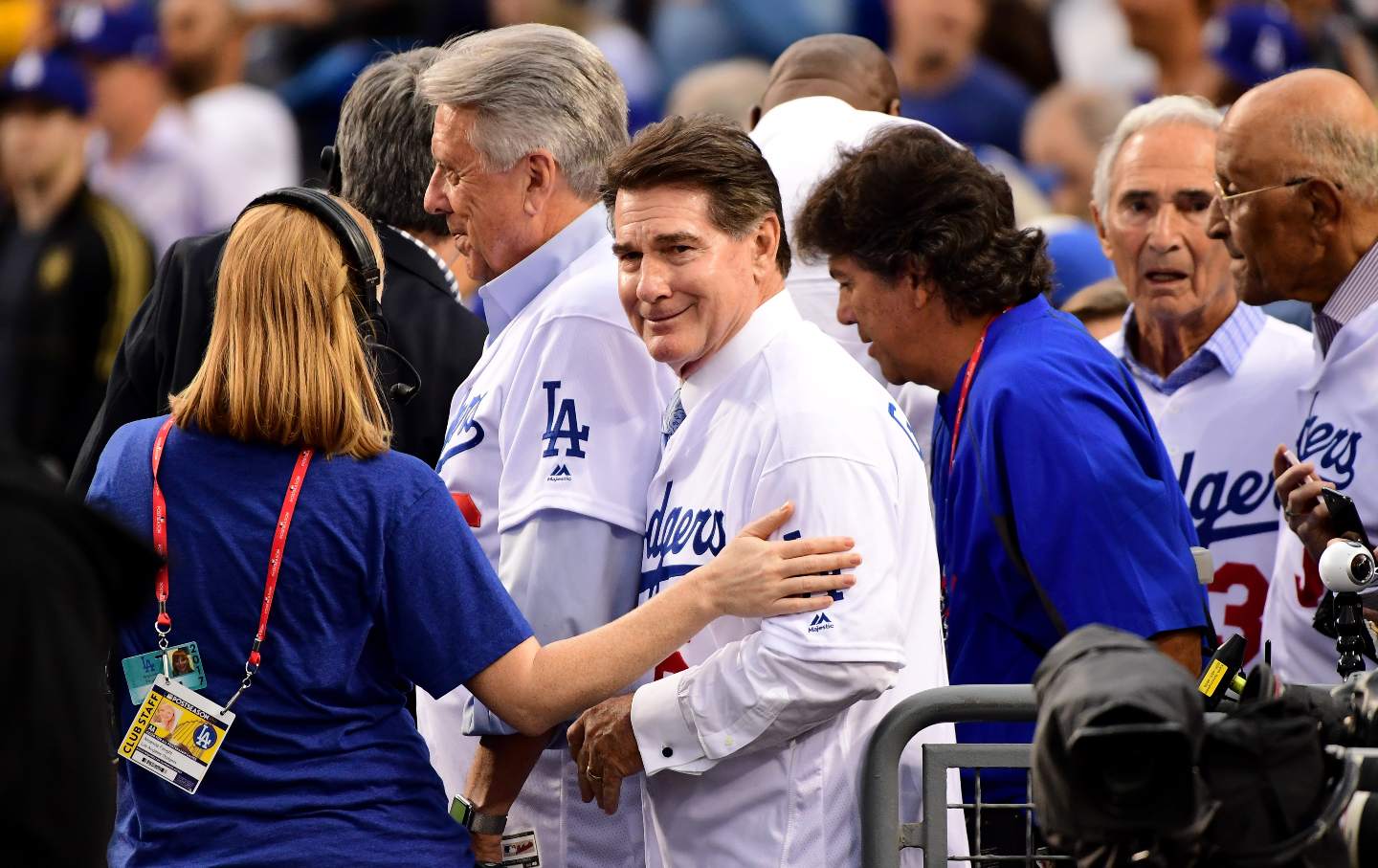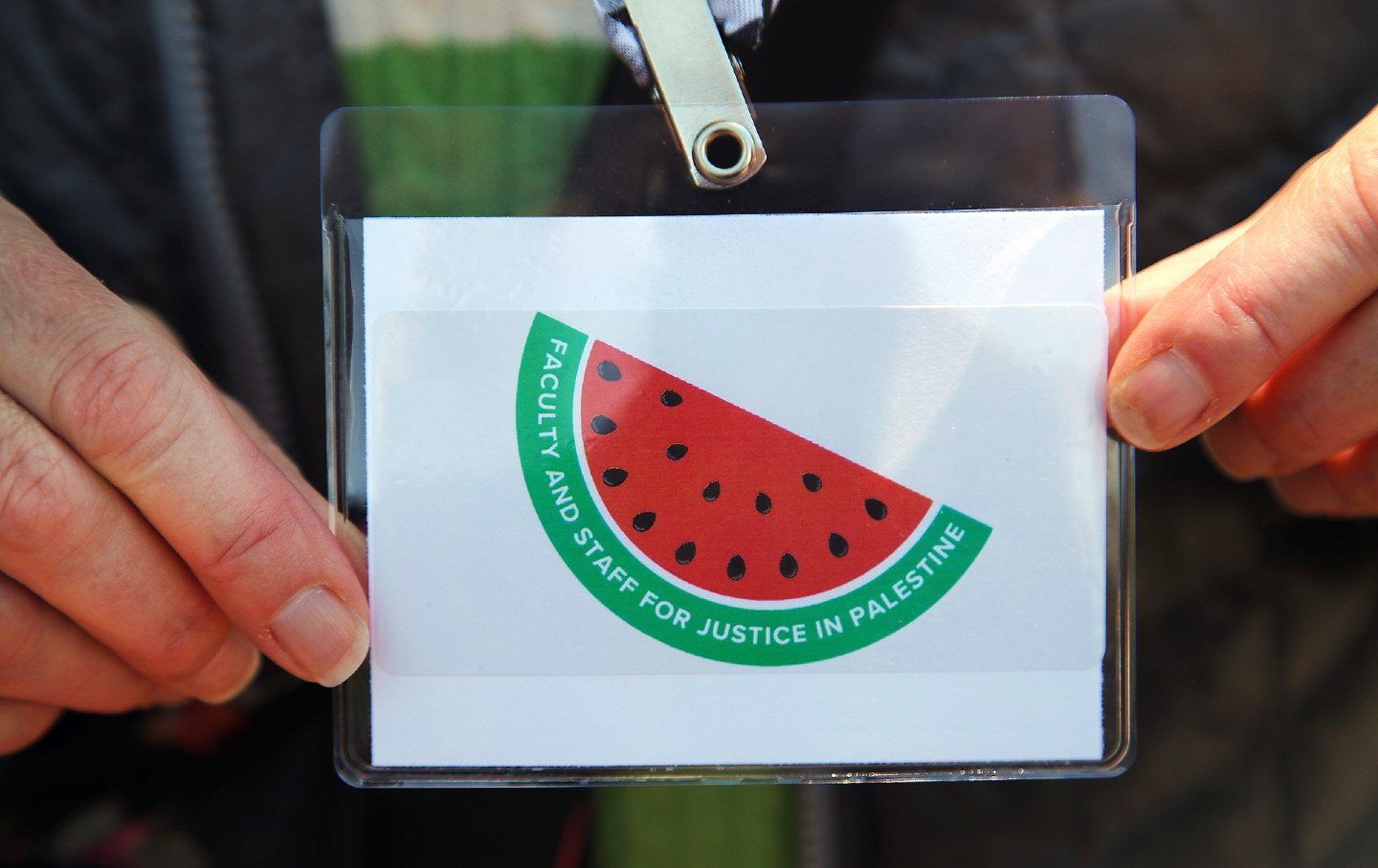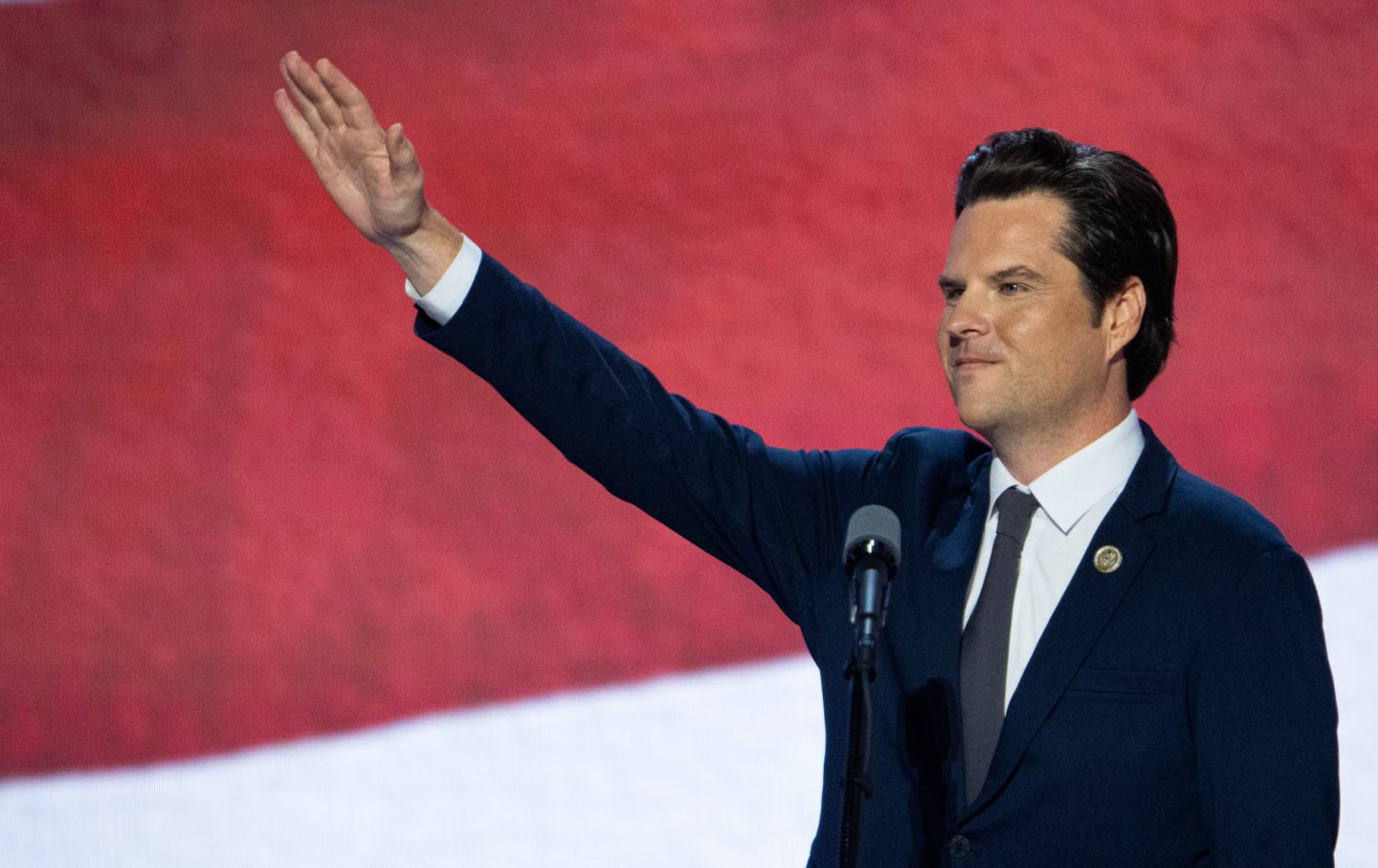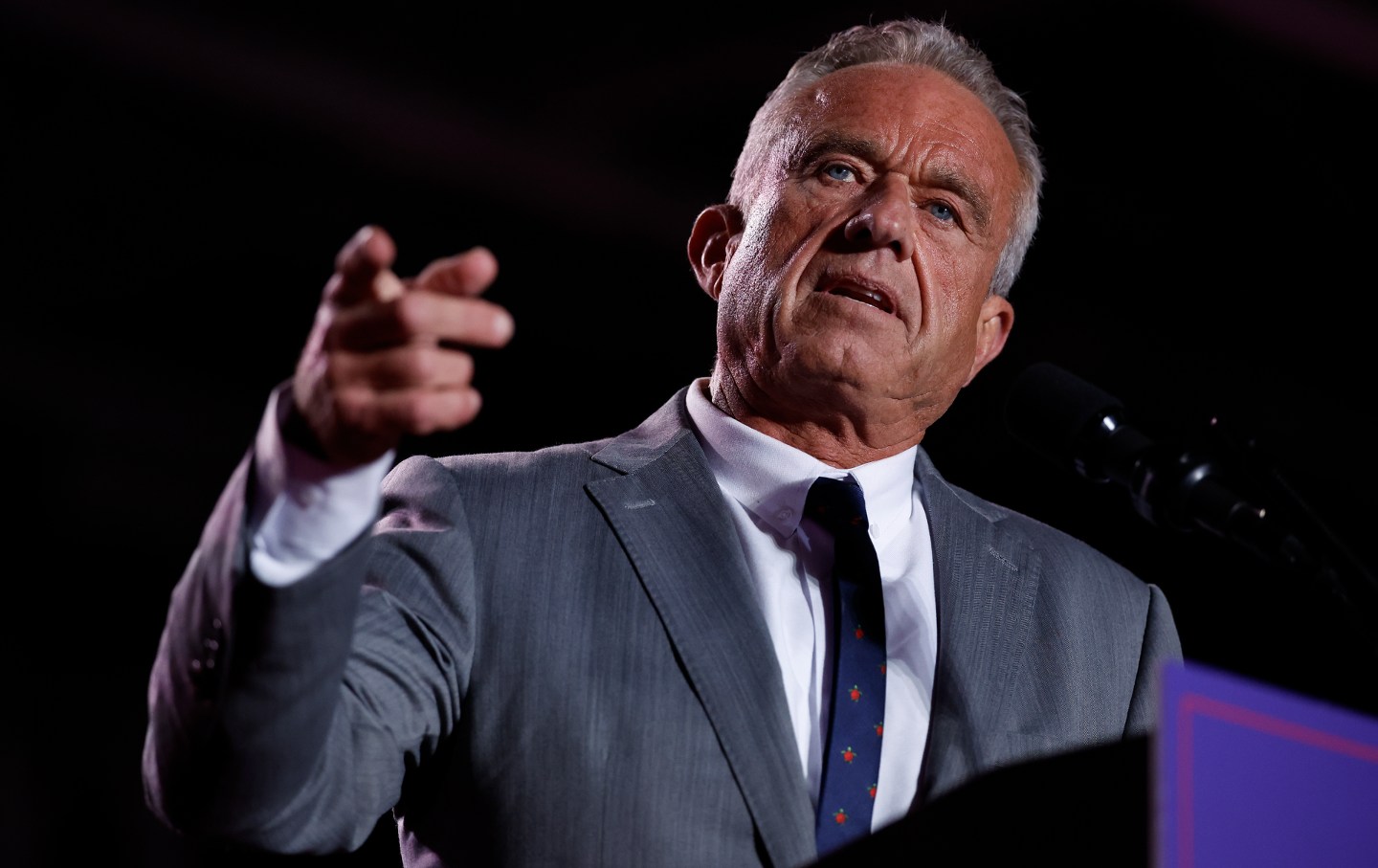Democrats Should Not Underestimate Steve Garvey
The former baseball star wants to fill Dianne Feinstein’s Senate seat in California, and his celebrity status might just give him a chance.

Former Los Angeles Dodgers player Steve Garvey smiles before game seven of the 2017 World Series at Dodger Stadium.
(Harry How / Getty Images)“It’s time to get off the bench. It’s time to put the uniform on. It’s time to get back in the game,” former baseball star Steve Garvey said in his video announcement that he was running for the US Senate seat to replace Diane Feinstein.
The 74-year-old retired athlete has been weighing a run for months, talking to donors and Republican Party leaders along the way. In June, when he registered as a Republican, he told reporters he was considering a Senate race. Few took his bid seriously. After all, of the state’s 22 million registered voters, 49 percent are registered Democrats, 24 percent are registered Republicans, and 22.5 percent are of “No Party Preference,” according to a recent report by the California secretary of state. The last time a Republican won a statewide race in California was in 2006, when Arnold Schwarzenegger beat Democrat Phil Angelides for governor.
Republican leaders know that Garvey’s odds of winning the seat are slim, but they are nevertheless drooling at the possibility of a Garvey campaign. They understand that his celebrity candidacy would boost Republican turnout in the March primary and, if he comes in first or second, in the November runoff too. That would help GOP candidates in six battleground House races in the state. This includes Congressional District 47, which Democrat Katie Porter is vacating to run for the Senate, and 13, 22, 27, 41, and 45, where Republican incumbents John Duarte, David Valadao, Mike Garcia, Ken Calvert, and Michelle Steel, respectively, are running for reelection. The outcome of those contests could determine whether the Republican Party can hold onto their slim—221 to 212—House majority, or whether the Democrats can take back the lower chamber in the November election.
Under California’s nonpartisan system, if no candidate achieves 50 percent of the vote in the March primary, the two top vote-getters, regardless of political party, advance to a runoff in November. Before Garvey threw his hat in the ring, Democratic Representatives Adam Schiff, Barbara Lee, and Katie Porter had already launched their campaigns. If these three split the Democrats’ vote, and Garvey garners almost all Republican voters and some baseball-loving independents, he could conceivably advance to the runoff.
A UC Berkeley/Institute for Government Studies poll conducted in late August found that Adam Schiff and Katie Porter were leading the field with 20 and 17 percent of voter support, respectively. Garvey was tied at 7 percent with Lee and Republican candidate James Bradley. Republican Eric Early, who has tried and failed to win public office many times, was at 5 percent. Now that he’s officially in the race, Garvey’s numbers will surge, likely pushing Bradley and Early to drop out. One in three likely voters were undecided, which is not a surprising finding with eight months before the March primary.
It isn’t clear if Senator Laphonza Butler, a Democrat and former labor leader whom Gavin Newsom appointed on October 1 to fill the remainder of Feinstein’s term, will enter the primary for a full six-year term. If she does, she would further divide the Democratic electorate, take votes away from Schiff, Porter, and Lee, and make it even more likely that Garvey makes it into the general election.
Garvey, a baseball icon, played baseball and football at Michigan State, was drafted by the Los Angeles Dodgers in the first round of the 1968 draft, and made his big league debut in 1969. He played for the Dodgers (1969–82) and San Diego Padres (1984–87) in the two largest voter-rich metropolitan areas in the state. Last week, he told the Los Angeles Times that he decided to jump into the race after “a Giants fan came up to me and said, ‘Garvey, I hate the Dodgers, but I’ll vote for you.’”
Garvey was a 10-time All Star and the National League Most Valuable Player in 1974. He led the Dodgers to a World Series championship in 1981 and the Padres to the National League pennant three years later. He was also the MVP in the National League Championship Series in 1978 and 1984.He earned four Gold Gloves as baseball’s best-fielding first baseman, had a lifetime .294 batting average, and had 2,599 hits during his 19-year career, ranking him 84th among all players.
As a professional, he was popular with fans, cultivating an image as an “All-American boy” who didn’t smoke, drink, or use drugs. He was good-looking, polite, and always available to reporters, who returned the favor with positive coverage.
In 1981—still a player then—Garvey talked about a future in politics, including a possible run for Senate. California is a much different, and bluer, state than it was back then. But Garvey appears willing to be a loss leader for the GOP if he can help the party’s congressional candidates beat Democrats in the key swing districts while also getting back into the media spotlight. One can already see Garvey’s ads: Dodger Blue and Padres Gold with an arm draped around his former Black and Latino teammates in a shallow attempt to appeal to California’s cultural diversity.
“It’s extremely expensive to establish name ID in a statewide race in California—up to $10 million if you are unknown to voters in order to start being heard,” Ray McNally, a longtime Republican consultant in California recently noted. “Garvey doesn’t have to do that—because of his celebrity he’s also going to receive a ton of free media.”
While many young voters may not know Garvey, he has drawn on his career to remain in the public eye—sometimes with much controversy. Described on his speaker’s bureau website as a “Future Hall of Famer and Marketing and Media Consultant,” he frequently gives motivational talks on the corporate lecture circuit. For a fee of at least $10,000, he will explain how to apply “the principles of teamwork” to enhance professional performance. He has earned substantial payments for promoting everything from reverse mortgages—where you can “hit a grand slam”— to “Exercise in a Bottle” diet supplements. (Garvey, and the company he was representing were sued by the Federal Trade Commission in 2000 over false claims made in diet commercials.) He has a history of financial recklessness, extramarital affairs resulting in children, and stiffing vendors and employees, all while living a luxury lifestyle.
Popular
“swipe left below to view more authors”Swipe →Garvey, who twice voted for Trump, recently told supporters that he would campaign on “quality of life” issues, including education, housing, crime, and the cost of living. “As a US Senator, I will serve with common sense, compassion, and will work to build consensus to benefit all of the people of California,” he said in a statement announcing his Senate run.
The United States, and particularly California, has a long history of celebrities jumping into the political arena and winning public office, including actors Ronald Reagan, George Murphy, and Clint Eastwood, as well as athletes such as basketball stars Bill Bradley and Kevin Johnson, football star Jack Kemp, Olympic athlete Bob Mathias, and wrestler Jesse Ventura. A baseball career has been a significant launchpad for would-be politicians, too. Since the early 1900s, more than 100 former professional ballplayers have been elected to public office, including two governors, three members of the House, and two US senators—most recently Hall of Fame pitcher Jim Bunning from Kentucky, who served in Congress from 1987 to 2011. But a number of Hall of Famers, including Walter Johnson, Cap Anson, Nap Lajoie, and Honus Wagner, struck out trying to get elected.
For years, Garvey has been campaigning unsuccessfully to get elected to the Hall of Fame. He can only hope that California voters have a better opinion of him—as a ballplayer and as a person—than the baseball writers. (He’s been on the Baseball Writers Association of America ballot for the Hall of Fame many times, and always failed to reach the 75 percent required for induction.)
One might be tempted to view Garvey as just another narcissistic hollow man who has lived a life in adulation and simply can’t give up the limelight. But in the age of Donald Trump, it is clear that, unfortunately, financial and sexual scandals do not automatically disqualify someone from running for, and winning, political office.
Garvey might not be measuring the drapes in a future Senate office, but Republicans are measuring his potential impact in helping the GOP hold on to the House, which would mean at least two more years for the Marjorie Taylor Greene/Matt Gaetz/Jim Jordan clown show running the circus. There is only one major takeaway here, and it’s that Democrats should take Garvey seriously.
We cannot back down
We now confront a second Trump presidency.
There’s not a moment to lose. We must harness our fears, our grief, and yes, our anger, to resist the dangerous policies Donald Trump will unleash on our country. We rededicate ourselves to our role as journalists and writers of principle and conscience.
Today, we also steel ourselves for the fight ahead. It will demand a fearless spirit, an informed mind, wise analysis, and humane resistance. We face the enactment of Project 2025, a far-right supreme court, political authoritarianism, increasing inequality and record homelessness, a looming climate crisis, and conflicts abroad. The Nation will expose and propose, nurture investigative reporting, and stand together as a community to keep hope and possibility alive. The Nation’s work will continue—as it has in good and not-so-good times—to develop alternative ideas and visions, to deepen our mission of truth-telling and deep reporting, and to further solidarity in a nation divided.
Armed with a remarkable 160 years of bold, independent journalism, our mandate today remains the same as when abolitionists first founded The Nation—to uphold the principles of democracy and freedom, serve as a beacon through the darkest days of resistance, and to envision and struggle for a brighter future.
The day is dark, the forces arrayed are tenacious, but as the late Nation editorial board member Toni Morrison wrote “No! This is precisely the time when artists go to work. There is no time for despair, no place for self-pity, no need for silence, no room for fear. We speak, we write, we do language. That is how civilizations heal.”
I urge you to stand with The Nation and donate today.
Onwards,
Katrina vanden Heuvel
Editorial Director and Publisher, The Nation
More from The Nation

Bosses Are Retaliating Against Workers for Showing Solidarity With Palestinians Bosses Are Retaliating Against Workers for Showing Solidarity With Palestinians
Too many workers are losing their jobs and professional opportunities for expressing pro-Palestinian sentiment. Other are choosing to self-censor amid a climate of fear.

The Women Who Remain in Gaza Will Never Leave Me The Women Who Remain in Gaza Will Never Leave Me
I survived eight terrible months of genocide. Now, I’m in exile—but I can’t stop thinking about the women who have remained.

BREAKING: Matt Gaetz Quits, and Journalism Still Matters—a Lot BREAKING: Matt Gaetz Quits, and Journalism Still Matters—a Lot
Forty-five minutes after CNN contacted Trump’s attorney general nominee about additional allegations of sexual misconduct, he was done.

The Red Wave Didn’t Hit Statehouses in This Election The Red Wave Didn’t Hit Statehouses in This Election
State-level Democrats largely held their ground, even scoring key victories in battleground states—and under Trump, that’s going to matter.

How Nominally Pro-Choice RFK Jr. Can Get Anti-Abortion Groups to Back His HHS Nomination How Nominally Pro-Choice RFK Jr. Can Get Anti-Abortion Groups to Back His HHS Nomination
He can pick a strident abortion opponent like Roger Severino, who wrote the Project 2025 chapter on HHS, as his number two.

Trump’s Second Presidency Will Only Accelerate America's Imperial Decline Trump’s Second Presidency Will Only Accelerate America's Imperial Decline
Trump is on track to bring a hasty end, silent or otherwise, to an “American Century” of global dominion.


